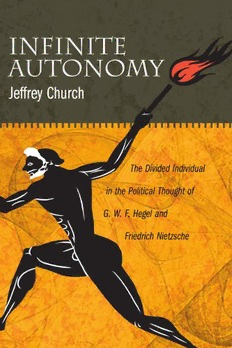
Infinite Autonomy: The Divided Individual in the Political Thought of G. W. F. Hegel and Friedrich Nietzsche PDF
Preview Infinite Autonomy: The Divided Individual in the Political Thought of G. W. F. Hegel and Friedrich Nietzsche
Infinite Autonomy 1188111100--CChhuurrcchh__IInnffiinniitteeAAuuttoonnoommyy..iinndddd ii 1100//1133//1111 1122::2222 PPMM 1188111100--CChhuurrcchh__IInnffiinniitteeAAuuttoonnoommyy..iinndddd iiii 1100//1133//1111 1122::2222 PPMM Infinite Autonomy The Divided Individual in the Political Thought of G. W. F. Hegel and Friedrich Nietzsche Jeffrey Church THE PENNSYLVANIA STATE UNIVERSITY PRESS UNIVERSITY PARK, PENNSYLVANIA 1188111100--CChhuurrcchh__IInnffiinniitteeAAuuttoonnoommyy..iinndddd iiiiii 1100//1133//1111 1122::2222 PPMM Publication of this book has been supported by the Jack Miller Center for Teaching America’s Founding Principles and History. Library of Congress Cataloging-in-Publication Data Church, Jeffrey, 1978– . Infi nite autonomy : the divided individual in the political thought of G.W.F. Hegel and Friedrich Nietzsche / Jeffrey Church. p. cm. Includes bibliographical references and index. Summary: “Argues that G.W.F. Hegel and Friedrich Nietzsche share a concept of individuality that combines autonomy and community, but that they develop this concept in opposite directions, leaving an irreconcilable tension between political means of individual fulfi llment”—Provided by publisher. isbn 978-0-271-05075-1 (cloth : alk. paper) 1. Hegel, Georg Wilhelm Friedrich, 1770–1831—Political and social views. 2. Nietzsche, Friedrich Wilhelm, 1844–1900—Political and social views. 3. Individuality. 4. Autonomy. I. Title. JC233.H46C57 2012 320.01—dc23 2011023349 Copyright © 2012 The Pennsylvania State University All rights reserved Printed in the United States of America Published by The Pennsylvania State University Press, University Park, PA 16802-1003 The Pennsylvania State University Press is a member of the Association of American University Presses. It is the policy of The Pennsylvania State University Press to use acid-free paper. Publications on uncoated stock satisfy the minimum requirements of American National Standard for Information Sciences—Permanence of Paper for Printed Library Material, ansi z39.48–1992 This book is printed on Natures Natural, which contains 50% post-consumer waste. 1188111100--CChhuurrcchh__IInnffiinniitteeAAuuttoonnoommyy..iinndddd iivv 1100//1133//1111 1122::2222 PPMM To Emily 1188111100--CChhuurrcchh__IInnffiinniitteeAAuuttoonnoommyy..iinndddd vv 1100//1133//1111 1122::2222 PPMM 1188111100--CChhuurrcchh__IInnffiinniitteeAAuuttoonnoommyy..iinndddd vvii 1100//1133//1111 1122::2222 PPMM Contents Preface ix List of Abbreviations xiii Introduction 1 1 Three Concepts of Individuality 8 1.1 The Natural Individual 10 1.2 The Formal Individual 17 1.3 Rousseau and the Historical Individual 22 2 Hegel’s Defense of Individuality 25 2.1 The Distinctively Human Subject and the Good Life 28 2.2 The Autonomy of the Laboring Subject 32 2.3 The “Infi nite Worth” of Individual Character 44 3 Hegel on the Ethical Individual 56 3.1 The Origin of Community 57 3.2 The Nature of Community 63 3.3 Politics as the Highest Ethical Community 78 4 Hegel on the Modern Political Individual 84 4.1 The Ancient Versus the Modern State 85 4.2 Expansion of Desire in Modern Commercial Society 87 4.3 Estates and Corporations as Ethical-Political Communities 96 5 Nietzsche’s Defense of Individuality 111 5.1 The Problem of Individuation in Nietzsche 113 5.2 The Will to Power and the Development of the Distinctively Human 117 5.3 Individuality as a Narrative Unity 129 1188111100--CChhuurrcchh__IInnffiinniitteeAAuuttoonnoommyy..iinndddd vviiii 1100//1133//1111 1122::2222 PPMM viii Contents 6 Nietzsche on the Redemptive Individual 140 6.1 The Tension in the Bow and Human Community 141 6.2 Silenus’ Truth 146 6.3 The Aesthetic Justifi cation of Existence 149 6.4 The Individual’s Redemption 154 6.5 Eros and Eris of Community 162 7 Nietzsche on the Antipolitical Individual 170 7.1 Historical Development of State and Culture in Modernity 171 7.2 On the Nature and Function of the Modern State 179 7.3 The Possibilities of Modern Culture 190 Conclusion 199 Notes 211 References 249 Index 259 1188111100--CChhuurrcchh__IInnffiinniitteeAAuuttoonnoommyy..iinndddd vviiiiii 1100//1133//1111 1122::2222 PPMM Preface I began thinking about a project on the modern individual several years ago as a way to get to the bottom of the disputes between liberalism and its many critics. I found that the claims and counterclaims—about indi- vidual rights, the liberal community devoted to defending these rights, and the ethos of self-reliant “individualism”—were based on different conceptions of what an individual is and ought to be, and were not fully intelligible apart from them. A Christian view of an ensouled human being, for instance, results in a very different political self-understand- ing than a Hobbesian view of individuals as bundles of passions. This project was motivated, then, by the age-old desire for self-knowledge, to understand who or what the modern individual is, and, more deeply, whether the modern individual fulfi lls what it means to be a human being or whether it corrupts or dehumanizes us. Yet I found that the most powerful challenges to liberal individuality from the nineteenth century to the present held that individuality is not real but an illusion. How can one understand the individual if it van- ishes under the force of these criticisms? These criticisms of liberalism in late modernity are familiar: advanced commercial societies dissolve individual freedom by submitting human thought and action to com- modity fetishism, ever more specialized and benumbing forms of labor, and manipulative and reifying forms of technology. Mass democracies undermine individual freedom with a tyranny of social custom and the disciplinary apparatus of the modern state. Structural patterns of in- equality strip individuals of effective agency while ever reproducing and deepening these same patterns. At a deeper philosophical level, universal “determinism”—the view that all events, including individual actions, are determined by previous natural or cultural causes—threat- ens individual agency as the “uncaused cause” with “ultimate causal responsibility” for its actions and with the capacity “to do otherwise” for any particular choice. 1188111100--CChhuurrcchh__IInnffiinniitteeAAuuttoonnoommyy..iinndddd iixx 1100//1133//1111 1122::2222 PPMM
